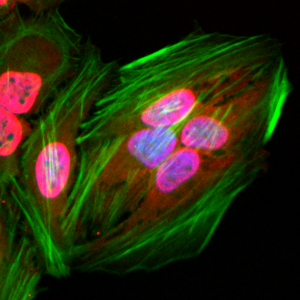anti-Acetylated-Lysine Rabbit Monoclonal (RM101)
| Code | Size | Price |
|---|
| REV-32-1012-00-C100 | 100 ug | £513.00 |
Quantity:
Prices exclude any Taxes / VAT
Overview
Antibody Isotype: Rabbit IgG
Antibody Clonality: Recombinant Antibody
Antibody Clone: RM101
Regulatory Status: RUO
Target Species: Universal
Applications:
- Enzyme-Linked Immunosorbent Assay (ELISA)
- Fluorescence-activated cell sorting (FACS)
- Immunocytochemistry (ICC)
- Immunohistochemistry (IHC)
- Immunoprecipitation (IP)
- Western Blot (WB)
Shipping:
Blue Ice
Storage:
+4°C
Images
Documents
Further Information
Alternate Names/Synonyms:
Kac; AcK
Concentration:
1 mg/ml
EClass:
32160000
Form (Short):
liquid
Formulation:
Liquid. 50% Glycerol/PBS with 1% BSA and 0.09% sodium azide.
Handling Advice:
Avoid freeze/thaw cycles.
Immunogen:
Acetyllysine -BSA.
Long Description:
Recombinant Antibody. This antibody reacts to lysine-acetylated proteins. No cross reactivity with nonacetylated lysine, and lysine with other modification. Applications: WB, IP, ICC, IHC, FACS, ELISA . Source: Rabbit. Liquid. 50% Glycerol/PBS with 1% BSA and 0.09% sodium azide. Acetyllysine (or acetylated lysine) is an acetyl-derivative of the amino acid lysine. Post-translational acetylation occurs on the epsilon amino group of lysine residues as a reversible and highly dynamic post-translational modification (PTM) that is known to be a key regulator in multiple cellular events, including chromatin structure, transcription, metabolism, signal transduction and cytoskeletal regulation. The acetylation of lysine residues in proteins is an important mechanism of epigenetics. It functions by regulating the binding of histones to DNA in nucleosomes and thereby controlling the expression of genes on that DNA. Non-histone proteins are acetylated as well. Histone acetyltransferases (HATs) catalyze the addition of acetyl groups from acetyl-CoA onto certain lysine residues of histones and non-histone proteins. Histone deacetylases (HDACs) catalyze the removal of acetyl groups from acetylated lysines.
NCBI, Uniprot Number:
N/A
Package Type:
Vial
Product Description:
Acetyllysine (or acetylated lysine) is an acetyl-derivative of the amino acid lysine. Post-translational acetylation occurs on the epsilon amino group of lysine residues as a reversible and highly dynamic post-translational modification (PTM) that is known to be a key regulator in multiple cellular events, including chromatin structure, transcription, metabolism, signal transduction and cytoskeletal regulation. The acetylation of lysine residues in proteins is an important mechanism of epigenetics. It functions by regulating the binding of histones to DNA in nucleosomes and thereby controlling the expression of genes on that DNA. Non-histone proteins are acetylated as well. Histone acetyltransferases (HATs) catalyze the addition of acetyl groups from acetyl-CoA onto certain lysine residues of histones and non-histone proteins. Histone deacetylases (HDACs) catalyze the removal of acetyl groups from acetylated lysines.
Purity:
Protein A purified.
Source / Host:
Rabbit
Specificity:
This antibody reacts to lysine-acetylated proteins. No cross reactivity with nonacetylated lysine, and lysine with other modification.
Transportation:
Non-hazardous
UNSPSC Category:
Primary Antibodies
UNSPSC Number:
12352203
Use & Stability:
Stable for at least 1 year after receipt when stored at -20°C.



